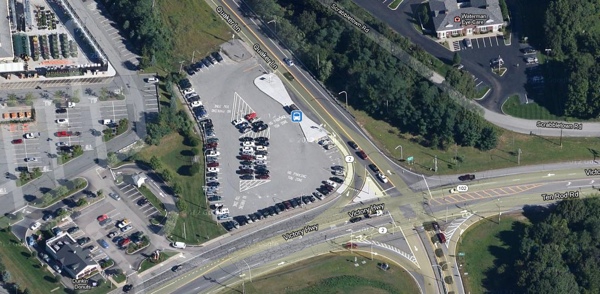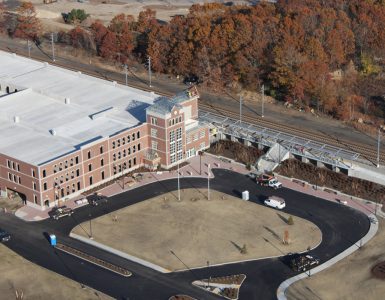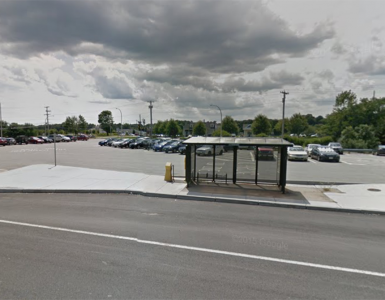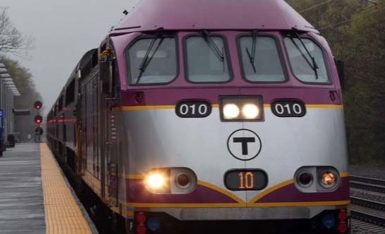
Park and Ride at Routes 2 and 102. Image from Google Maps.
[alert type=”warning”]This post was submitted Greater City Providence reader Peter Brassard. If you’ve written something you’d like us to consider posting, please contact us and let us know.[/alert]On Tuesday, January 15th there was a meeting of the Rhode Island State Properties Committee, where the Rhode Island Department of Transportation (RIDOT) requested clarification regarding a Request for Proposals (RFP) to sell the Route 2/102 Park and Ride lot near Wickford Junction Station. The original RFP offered to sell the land for private development, but stipulated that the Park and Ride lot would have to be relocated and rebuilt at the expense of the developer.
RIDOT asked for clarification on whether the intent of the RFP would still be valid, if the agency dropped the requirement that the Park and Ride lot be relocated and rebuilt. The committee indicated that they would not support that change. They felt that it would be a clear departure from the original RFP and would create unnecessary hardship on the public that relies on the free lot to access public transit or to park cars when people car pool. The committee chair also said that they had been told in the past by RIDOT that the Wickford Junction Parking Garage would not be available for free.
The committee questioned, if RIDOT’s request was because of a hardship incurred by the developer being unable to find an alternate location for the free Park and Ride or if it was because RIDOT needed to encourage ridership on the MBTA commuter train from Wickford Junction. The RIDOT representatives didn’t know, but said that as far as they knew everything was on the table.
The committee suggested that RIDOT should issue a new RFP to sell the Park and Ride and did not vote, but instead tabled the request. There was public commentary following, which was opposed to the elimination of the lot without providing some kind of free replacement. Over a half-dozen people testified including several elected and public officials out of the roughly 50 people that attended.
I haven’t heard what the current ridership numbers are for the Wickford station or if the numbers are below expectation. Effective January 19th, there will be new competition for commuter rail service from Wickford Junction to Providence. RIPTA will introduce a new express bus route #65, which will stop at the Route 2/102 Park and Ride. There will be six inbound #65 express buses during the morning rush hour and another five returning outbound in the afternoon.
Comparison of service Wickford Junction to Providence:
The train takes 25-minutes costing $3.25 one-way (or about $2.40 one-way with a monthly pass) ?
Parking: $4/day (or about $3.44/day with a monthly parking pass)
Minimum daily total: $8.24
The #65 express bus takes 29-minutes costing $2 one-way (or about $1.35 one-way with a monthly e-pass)
Parking: Free
Minimum daily total: $2.70
In a perfect world the $4 daily Wickford Junction garage parking fee, plus the price of a round trip train fare to Providence, should equal or be slightly less than what it would cost to park in a garage or parking lot in Downtown Providence for the day. In some cases it doesn’t work that way. An example is RISD, which has limited amount of parking downtown. The school offers parking at a dramatically reduced rate to its faculty and staff. There may be other downtown employers, who subsidize parking as well, which competes with both commuter rail and bus transit service. Some employers, such as Brown charge their employees for parking, but pay the entire cost of their employee’s transportation, if they use RIPTA, though as I understand it, does not include costs for driving or train fare. Federal employees are eligible for up $125 per month to pay for actual mass transit costs (bus, train, or Amtrak) and possibly more in the future. It’s not downtown, but by then parking at the VA hospital might be free. Since the state has so many offices less than a 7-minute walk from the Providence Station, what subsidies does it offer to its employees for mass transit or does it subsidize parking for free instead?
At a minimum the parking fee for the Wickford Junction Garage should be reduced to $1 per day ($20 – $23 per month) for a year or two or longer. The same tactic was used to get suburbanites to shop at Providence Place Mall, who under normal circumstances would never pay for parking. The approach worked.
To address the Route 2/102 Park and Ride, if it’s relocated into the garage, parking at the garage should be free and the garage should be open and available for use 24-hours a day, 7-days a week. Serious consideration should be given to provide free parking at the station to improve commuter rail ridership regardless of whether or not the Park and Ride is moved into the garage. What might have to be determined is how to subsidize or pay for discounts or free garage access.
Making the Wickford Junction garage free would set a precedent for future train station garages. A possible way to reduce that impact might be to define two separate garage zone types:
A. City – Paid Garage Zone
B. Suburban – Free Garage Zone
Cities such as Warwick, Cranston, Providence, Pawtucket, and Central Falls would be within a City – Paid Garage Zone. Towns, such as North Kingstown, South Kingstown, East Greenwich, or Westerly would be within a Suburban – Free Garage Zone. The problem with this kind of proposal is that the cities would actually be subsidizing parking in the suburbs, which is similar to much of the 20th century when cities effectively subsidized suburban housing and highways.
Coordination between RIPTA, RIDOT, and the MBTA needs improvement. Scheduling and fare integration or reduced fare packages should be introduced. Rerouting RIPTA’s #14 local bus to Wickford Junction Station to bring additional passengers to the station should be studied.
I don’t know what the specific demographics will be for #65 express bus, but generally the people that use express bus service are often similar to the people that use commuter rail, which typically are middle-class office workers and executives. The state may have been mistaken, when planning for commuter rail, if it assumed that buses serve one population and trains serve another. No matter what your economic level, for a 25-minute ride, is it worth an extra 5-bucks a day, for more comfortable seats, free wifi, and a slightly higher guarantee that you’ll rarely be delayed?





Excellent post, Peter.
I would submit that, if it came down to a choice between cities subsidizing parking downtown, or subsidizing parking in the suburbs, it’s better to subsidize the suburban parking even though it’s far from an ideal situation.
I agree wholeheartedly on the need for better coordination between RIDOT, RIPTA and the MBTA. Something important to note is that RIPTA has already modified the #66’s schedule to stop at Wickford Junction – they’ve just elected to only stop four buses there. Two inbounds in the morning, and two outbounds in the evening. They’ve chosen to completely ignore the potential for a trip in the opposite direction – and while I doubt there’s very much potential for a reverse commute into Wakefield or Narragansett, there’s certainly a lot of potential to attract out of state visitors to our beaches and the other tourist attractions in the area. Wouldn’t you want to take a train to the beach if you could?
Furthermore, while the #65 expresses straight to Wakefield, the #66 takes a more meandering local trip down to Kingston Station and URI first – and at present, this is the only link between Wickford and Kingston, which we should be leveraging to demonstrate that the demand is there for South County Commuter Rail.
On another note, concerning the #14, I would posit that its two branches of service need to be split apart. Newport is terribly underserved from the other side of the bay, with horrible headways on both the Newport-running branch of the 14 and the 64 operating from Kingston or URI. Google maps seems to suggest that Newport Gateway Center to Wickford Junction via 1A is a 26 minute trip: http://goo.gl/maps/j9OcF – so I think it’d be worth a deeper look at perhaps cutting the Newport service off of the 14 and instituting a Wickford – Newport (#61?) bus instead.
I like Ryan’s suggestion of a Newport-Wickford-Wickford Jct bus timed to meet trains there, it is worth an experiment, as one advantage of a bus is that there is no need for infrastructure changes to try such things.
This would help folks trying to get to MA but to Providence, it is probabaly quicker for Newport folks to take the frequent #60 bus, especially if they try some limited-stop expresses on that route as several have suggested on Ripta’s COA pages.
But for commuters who want on occasion to use a bus connection, but at other times a train connection, (similar for airport employees who have both serving TF Green) it is important to have a unified fare structure, kind of an easy-pass for transit systems as it is for toll authorities. That would also facilitate possible 50 cent transfers to RIPTA at PVD station if destinations there are too far to walk.
I’ve made this point several times at Northeast Corridor hearings, seeking to have Amtrak brought into a northeast transit easy-pass. One possible source of support might be Beverly Scott, once head of RIPTA but now running the MBTA. Several of us have contacted her for a meeting to discuss this kind of issue.
I think that a joint/cooperative fare product between RIPTA and the MBTA is probably number one on my list to increase rail use right now (other than a schedule increase which won’t happen any time soon). RI-ers are used to RIPTA (the ones who use it that is), so rail needs to be seen as a supplement and right now it is not. That way, users can choose which product they take based on their schedule versus cost, i.e. rail one way and bus another, or rail as primary and bus as a back up in case one works late or needs to leave early, etc. Once that happens, RIPTA and rail can be more cohesively combined at Providence, TF Green, and Wickford and having to pay for parking (for a portion of the users) would be more acceptable given the value of the entire “package” (rail+bus pass).
I think you’re underestimating the number of people in MA who might want to come to Newport and would be beyond thrilled to have a one-transfer option for getting there. (As the end to end trip on the 60 is well over an hour, I would expect that remaining on the train to transfer in Wickford for a 25 or 30 minute journey would be vastly preferable to switching in Providence, or to a 64 express if such a bus was available at Kingston.)
You can already transfer to/from commuter rail and RIPTA #14 at T F Green, why reroute the bus if it already touches commuter rail?
That’s one of the reasons why I don’t think rerouting the #14 is such a great idea and would rather reroute the #65/66, or take the Newport branch off of the #14 and terminate it at Wickford Junction instead. In fact, it’s the largest reason.
Why I suggested the routing of the #14 to begin with is for potential passengers along the entire length of the #14. The bulk of North Kingstown’s population lives in the eastern half of the town off of Post Road (the #14 route). A Newport originating #14 that terminates at the station would pass through populated areas to the south and part of Wickford only. I’m not saying it shouldn’t happen, but personally, I would have an objection to the elimination of Newport’s single daily express bus to Providence the #14, unless a fare reduction or modest transfer charge to the train were put in place. The current #14 Newport express starts in Middletown. A new Newport-Wickford Jct. bus should do the same and additionally stop in Jamestown, as the express doesn’t today.
North Kingstown’s segment mostly north of Quonset has a high amount of residential development, which would have no convenient way to access commuter rail by public transit. For this area the typical driving time is about 15-minutes to Wickford Junction. It would be a tough sell to get people to drive 15-minutes south to catch a northbound train that takes 25-minutes to get to Providence for a total 40-minute trip (plus the extra time to park and the costs), when if they drove straight from their neighborhood directly to Providence would take about 25-minutes.
Using TF Green Station would be torture for that population if they had to take the #14 or drive up Post Road through EG, Apponaug to get to the Warwick station or alternately if they used Route 402/403 to 4 to 95 to the airport connector. Either way during rush hour to get the Warwick station from a NK development near Quonset would take at least 20- and 30-minutes before setting foot on a train, so those residents may as well continue to drive all the way to Providence instead.
Ideally an East Greenwich station with its higher catchment area and less convenient highway access would have been a better first choice rather than Wickford. An EG station would easily have served the area north of Quonset. Having said that a lot of money has already been spent on Wickford Junction. There may be other ways to get potential passengers to the Wickford station. Maybe the entire bus system in this area needs to be rethought and reconfigured for commuter rail to succeed.
I like your last idea. The Kent County area as well as NK, SK, and EG areas should all be designed to feed the train service when there are trains and then supplement the trains at times when there are none with service to Providence. Commuter rail schedules change infrequently, so coordinating mode schedules should not be that difficult.
Again, a joint/coordinated fare structure is a must as part of this.
I get cranky about all the resources and headscratching dedicated to getting dozens, maybe someday hundreds of suburbanites to park and ride instead of drive all the way. Forget about them. We built the highways, they moved to the burbs. They have exactly what they want. Why the obsession with trying to change people who do not want to change?
I live in a part of Providence that boasts of its walkability. I walk to a lot of things, most days. But it is a pain in the ass to buy groceries, go to the movies, or visit or dine out in another part of town without driving. Most kids are driven to school day in and day out. Travel by bike is too scary for most people.
In the Providence metro, hundreds of thousands of people live a more or less suburban lifestyle in places that are dense enough to be adapted to allow excellent mobility by walking, transit and cycling. Even though some of these people will always want to drive everywhere they go, this is the population and these are the areas where great reductions in the need for car travel are achievable. This is where the resources and headscratching need to go. That idiotic gold plated garage is a monument to trying to solve an unsolvable problem while ignoring a solvable one.
I would expect the one #14 express bus out of Newport to stick around as a #60 express – whether that’s because of a simple rebranding to reflect the disappeared #14 local from Newport or because it gets rolled into an actual #60 express service, which some have called for.
I think one of the biggest problems with the #14 and the #65/66 is that they should really be three or four separate bus routes. Realistically, the #14 could be broken up right now into the Wickford – Newport service, a matching Wickford – Narragansett service, the segment of #14 that spans from Wickford to the Airport, and then a “#20 Express” for the last leg into Providence. It’s probably much easier to come up with extra buses to assign to each of these 25~30 minute segments rather than assigning more buses to the monolithic #14 route. We could additionally mitigate concerns over the introduction of transfers by interlining at least some of these bus routes with each other, and by providing the $1 transfer to the Commuter Rail that should have already been put into place when service into T.F. Green started, let alone now that Wickford is up and running.
Long term, I think the bus network does need a dramatic restructuring – we should have several smaller bus hubs akin to Pawtucket’s hub sprinkled throughout the state, rather than sending everything to KP – even the routes that don’t necessarily need to be anchored by KP. This will hold especially true once Woonsocket Commuter Rail gets up and running and if we ever start building infill stations in East Greenwich, Cranston or Olneyville.
Well, we HAVE the Wickford/Interlink garages, to see any further RI rail improvements we should make it work as well as possible, so I think such negativism is best avoided. There are indeed plenty of park and ride users at MBTA stations in MA.
There are some helpful ideas already posted above, how to move them forward is worth discussing further.
But evidence (google Don Shoup for example) suggests “free” parking and no transit incentive makes transit a very hard sell no matter what form, so some attention needs to be called to levelling the field for parking/transit. Promoting RIPTA’s “ecopass” and extending it to commuter rail is one way to go. In my opinion, the worst employer for transit is the State of Rhode Island which despite a 2008 law mandating efforts to reduce state employee commuting vehicle miles has done nothing. Worse of all is URI-Providence which at great expense leases garage parking to offer “free” parking for faculty/staff/students despite transit access from all directions, bus and rail both. This is also a regressive policy whereby students unable to afford a car subsidize those that do. I note there is already a bill, S27 filed in the legislature to phase in a transit pass for URI/RIC/CCRI students though it only apples to buses.
I’ve not seen this myself, but it was pointed out to me in the past that the majority of license plates found in the South Attleboro MBTA parking lot are RI rather than MA. Is the South Attleboro parking lot free? Also, what is the percentage of Massachusetts MBTA stations that charge for parking? And, if they do charge how many are in the suburbs?
I was by no means suggesting in my last comment that driving to Providence should be a priority. It’s just the way things are set up now, it’s often easier to drive to Providence instead of using mass transit.
To reiterate or clarify to get primarily North Kingstown residents, but also others, to use the train to Providence from the Wickford station, some variation of the following three items would need happen:
1) Fare integration or discounts between RIPTA and MBTA
2) Frequent Post Road bus service in both north and south directions, that would directly feed passengers in and out of Wickford Junction and be timed to meet trains
3) Reduce the cost to park in the garage or make it available for free
As Barry pointed whether they were best choice or not, the garages at TF Green and Wickford Jct. are already built and we need to find a way to encourage their use and the use of commuter rail.
Parking is $4 at South Attleboro.
Pretty sure parking in all MBTA controlled lots are $4. You’d be surprised how may people still drive from central RI to South Attleboro to get the more frequent train schedule and not pay the $9 parking at Providence (if they can even get a spot since it fills pretty early on workdays).
South Attleboro is also positioned 200 feet over the MA border, with the immediate and useful highway access that is a prerequisite for a good park-and-ride station, and getting to it from Pawtucket and Central Falls is much easier than trying to access Providence even before you start factoring in the cheaper parking and the fact that fares into Boston are $0.75 cheaper than they are out of Providence.
I believe every commuter rail station charges for parking – although given that most of them are unattended parking lots with a platform in far flung rural bedroom communities, I’m not sure what mechanism to enforce payment for parking actually exists beyond the honor system and perhaps some tow company “getting lucky.”
Something I keep meaning and forgetting to point out when I post about Wickford Junction that Peter and others have pointed out – we’ve already built Wickford Junction. We are now on the hook for the construction and maintenance of that facility no matter what happens. The third and fourth floors of Wickford Junction? They’ve been blocked off and are not in use, in part because of the extreme low demand at that station. Every space that goes unfilled has the exact same revenue impact as a “free parking” space being subsidized by the city.
I believe we should at least TRY dropping the cost of the station to $1/day before throwing in the towel and making parking free there, but at the end of the day, it costs us the same whether there’s 1100 empty spaces in that garage or 1100 cars parked for free there. The only difference is whether or not we’re getting something out of it.
I can emphasize with the frustration that Andrew and others have expressed at the fact that RIDOT has prioritized the suburbs over the city (and I say that, Andrew, as one of those suburbanites who drives his car to Kingston every day and takes Amtrak’s Northeast Regional into Boston – sorry I’m not some kind of zealous anti-transit car fanatic caricature of a human being, because I know that would fit your “they have exactly what they want” narrative a whole lot better than my actual attitudes and opinions), but, frankly, I’d much rather have something than nothing at the end of the day. Our course has been set and we’re on a trajectory towards “something” – we can try and course correct, and we should try to course correct, but slamming down the brakes now with high minded attitudes about who deserves transit first/more/at all isn’t going to get us any closer to EMU shuttle rapid transit through metro Providence. All it’s actually going to do is cause nobody to get the train – not South County, not Woonsocket, not Cranston, not Pawtucket, nobody.
“emphasize”? Geez, that’s what I get for failing to proof-read before posting this late at night.
Obviously, that’s supposed to say “empathize.” Please excuse any other spelling/grammar errors I may have made and not noticed.
Don’t take it personally, Ryan. Like all of us, you are an anecdote, not a statistic. I envy your reading time.
When we drop big $$ on a project that does not succeed, the impulse to keep at it in hope the cost will eventually be justified can be overwhelming. Usually, the best way forward only becomes apparent when we remove sunk costs from our cost/benefit calculations.
In a way, overspending on commuter rail is good money being thrown after all the bad money long sunk into the great project of auto-dependent suburbia. Just when long commutes were beginning to restrict demand for ever farther flung housing, we made it easier to develop the last few farms and open spaces. The cars of those new commuters will someday fill the Wickford Garage. Hooray!
I know, I know. It’s funny you should mention reading time since the spring semester starts tomorrow for me.
It was the “Why the obsession with trying to change people who do not want to change?” line that set me off, for the most part. If all the resources pointed at the suburban park and ride demographic make you cranky, then it’s dismissing the suburban communities as people who will just oppose urbanism no matter what and therefore aren’t worth negotiating with that makes me cranky.
I think that if you look at many of the regional commuter rail operations in New York and all points south, as well as Metro-North and Shoreline East, you find a great many suburban park-and-ride stations that are amazingly successful. I think the takeaway from Wickford Junction is that it’s a bad station because it was overbuilt, it’s a bad station because the idea of a shopping plaza anchored by Walmart and Staples being any kind of TOD is laughable, it’s a bad station because you can’t go anywhere from Wickford Junction except back the way you came, and it’s a bad station because of a total systemic lack of cooperation between RIDOT and RIPTA. There was never a unified vision – I’m no longer certain that RIDOT had any solid plan for Wickford. Perhaps it was meant to be a footnote on the South County Commuter Rail press release, and trains were never meant to terminate there – I don’t know. But I don’t think that Wickford Junction is a bad station because it’s a park-and-ride.
And I think that the idea that all/most suburbanites would never use mass transit is a folly. I think you’d find if you actually asked someone who was dead-set against mass transit “why?” the answer would be, more often than not, complaints about the actual functionality of the train. “It’s too slow, it doesn’t run when I need it to run” – those kind of complaints. And I don’t think that addressing those complaints is an either/or proposition against better access for urban residents. (In fact, I think it works both ways – once you have people regularly riding into Providence, the next question might be “well, why can’t I get to the zoo from the train? Why can’t I go to Cranston?”
General Assembly Press Release: